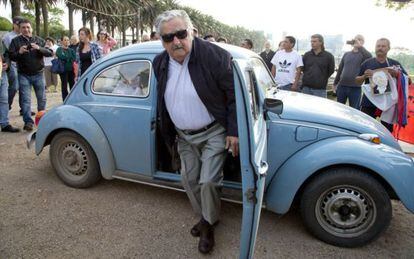Uruguay to choose President Mujica’s successor in November 30 runoff
Frente Amplio and Partido Blanco candidates to face off in second round


Uruguayans will have to return to the polls on November 30 to decide who will succeed José Mujica as their president. As the surveys predicted, none of Sunday’s candidates received the necessary 51 percent of the vote to win outright in the first round. Frente Amplio candidate Tabaré Vázquez and Partido Nacional nominee Luis Lacalle received the most votes – 46 percent and 31 percent respectively – and will now go head to head in the runoff. With 84 percent of votes counted, Partido Colorado stood in third place with 13 percent and the Independents won about three percent.
If facial expressions and body language reveal more than words, there was one clear winner on election night: Tabaré Vázquez. The happiness he showed as he stood before his supporters three hours after the polls closed was in direct contrast to the dejected tone of his rivals. Surveys rightly predicted the contest would go to a second round, but showed Vázquez winning fewer votes than he eventually received.
They were also wrong about Partido Colorado, which received fewer votes than predicted. The party had already said it would support Lacalle in the runoff, but as things stand, together Blanco and Colorado do not have enough votes to beat Vázquez. Hence the former president’s jubilation. Vázquez expected to have to face a second round, but no one foresaw him having such a big advantage.
The achievements are there. But, as is the case in Chile, the electorate has become more demanding
The first results of the legislative elections, which also took place on Sunday, failed to guarantee Frente Amplio the majority it has held in parliament since 2004. However, Vázquez said he was on the verge of getting that majority but prefered to wait until the official results were confirmed. Still, four hours after the polls closed, he told Frente supporters: “We have practically won the majority in parliament again.” He was interrupted by people shouting: “The people united, will never be defeated.” He then went on to say: “And that is an acknowledgment of Frente Amplio’s nine years in government.”
Uruguayans also participated in a plebiscite to decide whether to reduce the age of criminal responsibility from 18 to 16, a measure proposed by the center-right Partido Colorado, which built support by collecting signatures. Even though public safety is Uruguayans’ top concern, the proposal was voted down by 53 percent to 46 percent.
Beyond those results, Uruguayan democracy was also a winner on Sunday. The campaign unfolded without insults, catastrophic declarations, or accusations of corruption. Until the last moments, there was a celebratory atmosphere in the streets and it wasn’t unusual to find supporters of one camp sharing a drink or chatting with rival groups. The conduct of all the candidates was exemplary – the style that would win them the most support in a society where verbal attacks are scarce.
Social progress has created frictions that play out in the streets
Now, the parties will have to adjust their strategies ahead of next month’s runoff. Tabaré Vázquez has had everything in his favor: the career of an honest man who previously led the country between 2005 and 2010 and remains a popular politician, even more so than José Mujica. And he has also had Frente Amplio’s undeniable economic successes. In 10 years in power, the party has lifted 900,000 people out of poverty, almost a third of the population, and got unemployment down to six percent, the lowest in history. Nevertheless, Partido Blanco candidate Luis Lacalle has still gained ground over the last four months.
Lacalle brought with him a groundbreaking message: “For a yes.” Meaning, he is in favor of dialogue, and of acknowledging Frente Amplio’s successes. He emphasized that he was neither on the right nor the left, but rather “a pragmatist, a liberal conservative,” who puts management before any ideology. But some voters saw in Lacalle the same neoliberal mentality with which his party, led by his father, former President Luis Lacalle Herrera (1990-1995), carried out the largest privatization program the country has ever known. Lacalle tried to combat this accusation by hiding his father on the last rung of the party’s list of candidates for Senate and by using images that voters identified with Frente Amplio in his electoral ads: wind turbines for wind energy, computers for school kids ...
The achievements are there. But, as is the case in Chile, the electorate has become more demanding and impatient in the face of unfulfilled promises. President José Mujica promised “education, education, and more education” in his first presidential speech, but Uruguay registered the worst results in its history in the 2012 Programme for International Student Assessment (PISA) report, falling to 55 in a ranking of 66 countries.
Vázquez expected to have to face a second round, but no one foresaw him having such a big advantage
Social progress has created frictions that play out in the streets. Montevideo, where half the country’s inhabitants live and where Frente Amplio is in power, has 24 kilometers of coastline on Río de la Plata. There are always people fishing, walking, running, or riding bicycles along the city’s boardwalk, which is known as La Rambla. The problem is, cyclists can only use two kilometers of the walkway. “We have had a progressive government in the city for 20 years that has done very little for a progressive sector like cycling,” complains Gustavo Izús, the Argentinean coordinator of activist group, Ciclovida. “Meanwhile, in Buenos Aires, there was a center-right party in power and there are free bike rental services available.”
Enrique Moreno, chief of urban mobility in Montevideo, responds: “To say that we have barely done anything for cycling speaks of ignorance about the history of this country. In 2002, there was a crisis during which people did not even have money to get on public transport and bicycles had to be used. Now there are lots of people who have cars and motorcycles. And the 20 kilometers of bike lanes we’ve built in the old quarter are not enough. Citizens have become more demanding. We want the same progress we see in countries like Germany but we do not have Germany’s funds.”
Whoever gets elected in November knows there is a long journey ahead, many kilometers of roads to repair, educational reforms, big improvements in security ... And a great deal of dialogue to tackle them.
Translation: Dyane Jean François










































